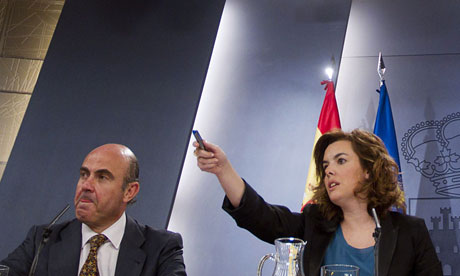Spanish banks to face new scrutiny as fears rise

Spanish deputy PM Soraya Saenz de Santamaria (C), economy minister Luis de Guindos Jurados (L) give a press conference at the Moncloa Palace in Madrid, on 11 May 2012. Photograph: Jaime Reina/AFP/Getty Images
Spain's government moved to quash doubts over the health of the country's banks by ordering an independent audit of assets held by the entire banking sector and a fire sale of repossessed land and homes. The banks were also told to set aside a further €30bn (£24bn) in provisions against potentially toxic property assets.
At the end of a traumatic week for Spain, prime minister Mariano Rajoy's People's party (PP) government claimed the moves would shine a bright light on what critics see as the excessively opaque world of Spanish banks.
"This reform will bring credibility and build confidence in the financial sector, increase credit flow in our country and lead to home sales at reasonable prices," said deputy prime minister Soraya Sáenz de Santamaría.
Two independent valuers will do separate audits to value Spanish bank assets over the next four months. Banks must also hive off their burgeoning stock of repossessed land and property into separately run companies for the fire sale.
The Spanish finance minister Luis de Guindos expected banks to ask for up to €15bn in extra financing from the country's restructuring fund to cover the provisions.
The €30bn is, however, below the level many analysts consider is needed by Spanish banks. Sources spoke of up to €50bn over the past few days and some Spanish economists think much more is needed.
"The figures that international analysts manage go from €50bn to €300bn," said Xavier Sala-i-Martín, a prominent Spanish economist at New York's Columbia University, in his blog before yesterday's announcement. "The policy of mergers and private recapitalisation imposed by the Bank of Spain has clearly not functioned and, by preventing banks that are bust from closing their doors, has created a series of zombie banks that neither lend nor allow others to lend and so paralyse the economy."
The measures were announced two days after the government nationalised Bankia, the country's fourth largest bank. Bankia had to be taken over after auditors had refused to sign its accounts, apparently because of discrepancies over the value of junk real estate loans and foreclosed properties.
The real estate loan portfolios of Spanish banks are a hangover from the country's property crash, when a decade-long housing bubble burst in 2008.
Yesterday's provisions, which came on top of €50bn announced in February, were to cover only loans to developers, land speculators and builders. These have turned out to be a far greater danger than mortgages taken out by ordinary Spaniards during the housing boom.
The Bank of Spain has warned that €184bn of these loans, 60% of the total, are "problematic". The new provisions take overall coverage to 45%.
"That coverage is very, very strong," said Juan José Toribio of Spain's IESE business school. "It is hard to think you can go much further."
Banks have a month to say how they will find the €30bn – required to cover loans and assets that are not currently problematic but might go sour as Spain dives into a second recession in three years.
With unemployment at 24%, austerity measures biting and house prices falling, a housing recovery is not on the horizon.
The European commission yesterday forecast that Spain would have to ramp up an already severe austerity programme to meet its pledge of slashing the deficit from 8.5% of GDP to 3% over two years. Current measures, it predicted, would leave the deficit at 6.3% next year.
De Guindos claimed taxpayers would not lose money with the latest reforms, but also said loans might eventually be turned into shares – meaning further nationalisations.
Analysts welcomed the measures, but doubted they would solve Spain's problems.
"It's a significant step in the right direction, particularly the approval of an independent audit, and provides a measure of reassurance that Spain is coming to grips with its banking troubles," said Nicholas Spiro of Spiro Sovereign Strategies.
"Spanish bank restructuring is a moving target: the deeper the economic downturn, the greater the uncertainty about the size of the sector's provisioning needs," he added. "It needs a shock-and-awe-type programme to restore confidence in Spanish banks, but this would require some form of external assistance."
Some commentators believe only the European Financial Stability Facility (EFSF) rescue fund has the firepower needed to deal with the problem.
"There is no credible way out of this without European help," said Luis Garicano, of the London School of Economics, in his blog. "We must find a way to use the EFSF to rescue our banks, rather than the country."

No comments:
Post a Comment